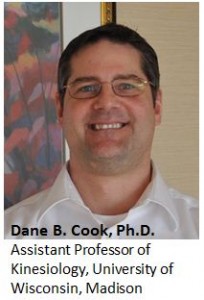Post-exertional malaise a defining, compulsory and cardinal feature for diagnosis under most current criteria. The term "malaise" defined by wikipedia as: a feeling of general discomfort or uneasiness, of being "out of sorts", often the first indication of an infection or other disease. This poor description of the symptoms caused the term PENE (Post-Exertional Neuroimmune Exhaustion) to be used as a mandatory requirement for the International Consensus Criteria more accurately describing the exacerbation of symptoms that were described by patients.
But what is PEM? - depending on how you look at it, PEM could refer to the increased pain and fatigue people with ME/CFS experience after exercise, reduced aerobic energy production during exercise, an earlier entry into anaerobic energy production, reduced cognitive results on tests, impaired pain regulation, increased activation of the complement system, increased oxidative stress, and finally changes in gene expression (gene expression research by Alan and Kathy Light Utah University)
The Cook/Light/Broderick research into defining and deciphering PEM in terms of what is actually happening that can be related to symptoms experienced, uses maximal exercise (test to exhaustion) as the stressor with blood tests pre and post exercise.
This study, which was published in 2013, found startling changes in several receptors. These included an adrenergic (sympathetic nervous system) receptor and the NR3C1 receptor that binds with cortisol. A receptor that regulates ATP production (P2X) tanked at 48 hours and then basically disappeared at 72 hours in the ME/CFS patients. The opposite pattern prevailed in the healthy controls.
NRC31 is the receptor to which cortisol and other glucocorticoids (steroid hormones such as hydrocortisone, prednisone, and prednisolone) bind. This receptor is found in the cytoplasm of the cell. After cortisol flows through the cell wall and attaches to it, it’s transported into the nucleus where it affects a variety of genes. Found in almost every cell in our bodies, NRC31 turns on or off genes involved in metabolism and immune functioning. Glucocorticoids turn the immune system down by upregulating anti-inflammatory and downregulating pro-inflammatory cytokine levels. According to Wikipedia, NRC31 also appears to play a major role in regulating the effects of stress on the brain. Cortisol also spares glucose in response to exercise. This was the first time gene expression of the cortisol receptor had been studied in response to exercise. The increased levels of inflammation expected with an upregulation of this receptor are what we would expect to find in ME/CFS. The significant increases in this receptor seen after exercise in the ME/CFS patients could reflect an attempt to make more glucose available for energy or, perhaps more likely, reflect an attempt to reduce inflammation induced by the exercise.
An analysis of the symptoms elicited by the exercise revealed a remarkably heterogeneous group, memory and concentrations were highlighted in some people while headaches were the biggest component in others one unfortunate person suffered from headaches, chills, and muscle pains. Muscle pains were almost the sole issue for one person, while another person’s joint pains improved markedly. While most people got worse, a few people actually got a bit better – one person’s joint pain improved markedly. Exercise clearly has very different effects in different people with ME/CFS. The whole issue of symptom expression is complicated by the fact that many peoples’ symptoms, even at baseline, are already near the top of the charts. Even though they feel much worse after exercise, according to the charts they can’t get much worse! This “ceiling effect” complicates assessing symptom changes after exercise.
Cognition
If you feel that thinking is harder after activity then PEM affects on symptoms show the opposite outcomes that healthy controls exhibit with an improvement in brain function with exercise.
If practice makes perfect then the more the brain is is used performance should increase, which it does for healthy controls but acts as a stressor with diametrically opposite results in ME/CFS getting worse the more cognitive function is tested.
Sustained attention was already poor at baseline, but it takes an even bigger hit after exercise. Other areas of the brain work extra hard to compensate – making cognition more effortful – but the effort largely fails and the errors mount and mount. By the end of the test the ME/CFS patients were making about double the errors of the healthy controls. Plus their symptoms – whether it’s headaches and chills in one patient or muscle pain and trouble concentrating.
A reduced ability to think after exercise is documented and tied to changes in brain functions. Reductions in the ability of ME/CFS patients ability to sustain attention stand out, as does the need to engage more regions of the brain than usual to do mental exercises. People with ME/CFS also get worse, not better over time, when they engage in mentally fatiguing exercises. Healthy people react in the opposite manner at all points; in contrast to the people with ME/CFS they do better over time and after exercise at mental tests. Cook essentially documents and expands on the debilitating effects of exercise on ME/CFS which NICE are still recommending in the form of GET (graded exercise therapy) in their guidelines that have been in place since 2007.

 Whilst I actually 'can't' digest the full details, yet absolutely I get and appreciate the 'gist' ....which is (if I read right) that there are very REAL and actually DETECTABLE explanations of Post Exertional Amplification...(or PEM or PENE etc.)
Whilst I actually 'can't' digest the full details, yet absolutely I get and appreciate the 'gist' ....which is (if I read right) that there are very REAL and actually DETECTABLE explanations of Post Exertional Amplification...(or PEM or PENE etc.)